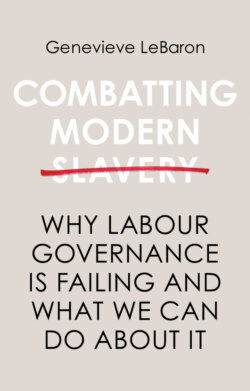Читать книгу Combatting Modern Slavery - Genevieve LeBaron - Страница 15
Corporate power and the state
ОглавлениеUnderstanding the changing nature and organization of corporations at the helm of global supply chains, and their deepening political power, is also essential to understanding why contemporary labour governance is failing to yield concrete improvements.
As corporations merge, monopolize and grow, they are exerting heightened control across broad global industrial sectors of production and consumption, and gaining even further power to dictate labour conditions within global supply chains. Further, changing patterns of financialization, corporate ownership and market speculation are introducing new and deeper pressures for corporations to produce profits for their shareholders. Under these circumstances, the value created within global supply chains is increasingly concentrated at the top, among investors and shareholders, and as profit.
At the same time, industry actors – including brand and retail firms, as well as big asset managers, big auditors and industry associations – are becoming increasingly proactive in initiating and shaping public regulations on supply chains, at the national and subnational levels, as well as in international conventions. In addition to longstanding lobbying activities, corporations are now seconding employees to national policy organizations, pioneering and funding civil society coalitions to stop slavery and human rights abuses by business, and integrating CSR initiatives into their long-term growth strategies. Yet, at the same time as they champion CSR initiatives to combat modern slavery and promote worker voice, industry actors are part of regulatory coalitions to fend off stronger labour laws and their enforcement. The result is that even the governance actors and initiatives we generally consider to be ‘public’ are often highly influenced by corporate power.
As I argue further in Chapter 3, the deepening political power of corporations is allowing them to leverage strategic control over supply chain governance initiatives, and especially those intended to bolster labour rights and reduce exploitation. It is staving off more radical reforms on corporate production activities, and it is undermining and co-opting civil society efforts to increase corporate liability and accountability for the worst forms of labour exploitation. It also troubles prevailing academic conceptualizations about the clean division between public and private, market and state, which has implications for solutions to these problems.
